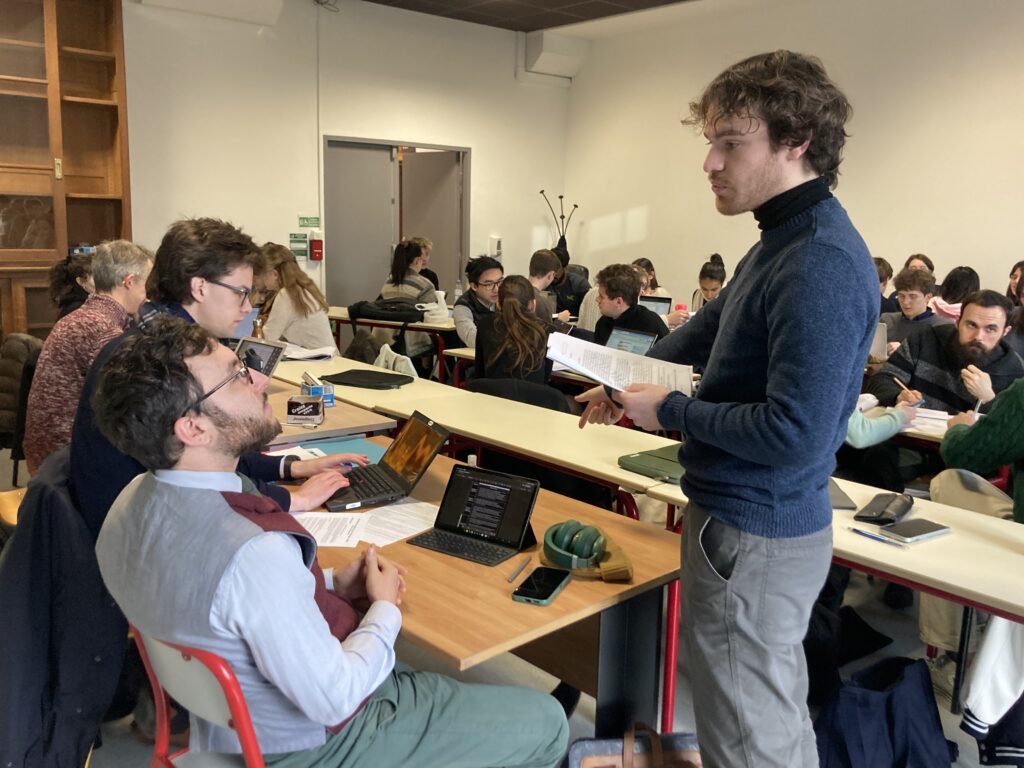Hugo Zylberberg, cybersecurity consultant and moderator of the ‘Serious Game’ at PSL Week, held from 25 to 29 November, looks at how the crisis scenario is developed and played out.
- Could you summarise the crisis scenario you designed for the PSL Week Serious Game organised by CIENS?
The serious game that we ran with Jean-Marc Gailis (4th year student in the geography department at the ENS) is based on a cyber attack involving several major world powers. The triggering incident is the unexplained deviation of a satellite’s trajectory, leading to a highly technical rescue mission in outer space to prevent a catastrophic collision.
Gradually, it becomes apparent that the satellite itself has been compromised and that the satellite images transmitted are no longer reliable, preventing efficient ground operations.
- What is the role of the students in this scenario?
The students, divided into teams of four, take on the role of political advisers specialising in cyber security, tasked with giving an opinion to the National Defence and Security Council (CDSN, a select body chaired by the President of the Republic). The information provided is fragmented, forcing them to formulate hypotheses and recommendations based on incomplete and sometimes contradictory data. Throughout the exercise, the students have to rectify their analysis and decisions, which reflects the reality of a crisis situation where the decision-makers never have access to all the information from the outset.
They have to navigate between confirmed information and areas of uncertainty. One aspect of this exercise is the absence of a single ‘right answer’. Some of the teams surprised us with their creativity and innovative proposals, which illustrates the extent to which cyber is a constantly evolving field. The students, who often come from diverse backgrounds and specialisms, have to get to know each other, listen to each other and work together, a situation that mirrors the challenges encountered in a real-life crisis unit where experts from different backgrounds do not always have the same vocabulary but still have to come up with a coherent response.
They have to navigate between confirmed information and areas of uncertainty. One aspect of this exercise is that there is no single ‘right answer’. Some teams surprise us with their creativity and innovative proposals, which illustrates the extent to which cyber is a constantly evolving field. The students, who often come from diverse backgrounds and specialisms, have to get to know each other, listen to each other and work together, a situation that mirrors the challenges encountered in a real-life crisis unit where experts from different backgrounds do not always have the same vocabulary but must still come up with a coherent response.
- What were your sources of inspiration for developing this serious game?
As a teacher, I like to use real-life situations to help people understand theoretical problems. Jim Waldo, a fascinating professor at Harvard, made a big impression on me: he taught a course on the intersection between technology and public policy and knew how to convey computer knowledge in a very concrete way. To explain to us what the IP protocol (data routing system) was, he divided us into small groups to play the role of servers in front of which he placed packets of documents (data packets), simulating the trajectory of this data from point A to point B.
This PSL Week serious game is based on the ‘9/12’ cyber strategy challenge organised by the Atlantic Council worldwide and by the Institut Français de Géographie de Paris 8 in France, which simulates a crisis resulting from a major cyber incident. We have created and then organised this competition in France since 2019, and each year it has enabled me to enrich my understanding of the dynamics of crisis management in a cyber context.
I’d like to take this opportunity to mention that the 2025 edition of the Challenge will take place from 29 to 31 January next year, and that students who would like to take part can obtain all the information they need to register here.
The deadline for applications is 13 December 2024.

